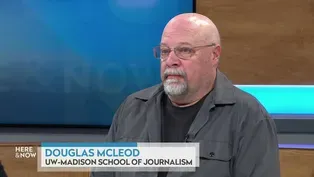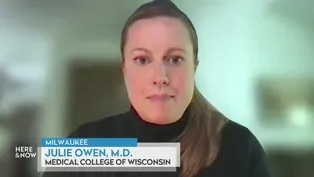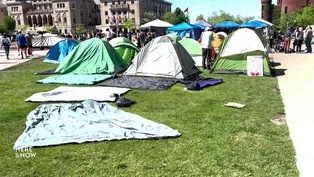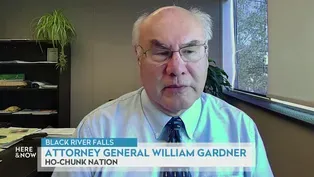Here and Now
Jane Graham Jennings on Funding for Crime Victim Services
Clip: Season 2200 Episode 2243 | 5m 48sVideo has Closed Captions
Jane Graham Jennings on a funding drop limiting capacity to provide aid to crime victims.
The Women's Community Executive Director Jane Graham Jennings describes how a drop in federal funding for grants to help victims of crimes impacts the Wausau-based agency's capacity to provide aid.
Here and Now
Jane Graham Jennings on Funding for Crime Victim Services
Clip: Season 2200 Episode 2243 | 5m 48sVideo has Closed Captions
The Women's Community Executive Director Jane Graham Jennings describes how a drop in federal funding for grants to help victims of crimes impacts the Wausau-based agency's capacity to provide aid.
How to Watch Here and Now
Here and Now is available to stream on pbs.org and the free PBS App, available on iPhone, Apple TV, Android TV, Android smartphones, Amazon Fire TV, Amazon Fire Tablet, Roku, Samsung Smart TV, and Vizio.
Providing Support for PBS.org
Learn Moreabout PBS online sponsorship>> Attorney General William Gardner, thanks very much.
>> Okay.
Thank you.
>> A 70% drop in federal funding to states to help victims of crime has advocates warning of dire consequences.
The grants to states for victim services are funded through federal fines and fees paid by people convicted of a crime, but the federal fund has sharply declined, leaving Wisconsin's annual funding expected to go from more than $44 million to roughly 13 million.
The Wausau organization, called the Women's Community, whose services help thousands of victims of domestic abuse, sexual assault and human trafficking, fears the loss of services.
Its executive director, Jane Graham Jennings, is here, and thanks very much for being here.
>> Thank you.
I'm happy to be here.
about how the drop in grant funds will affect your services?
>> Well, you know, the thing about serving victims of abuse, is it's not just one community.
So these the drop in funds will definitely impact the marathon County, which is where we serve.
And the Wausau community.
But it will impact every community in our state because all of the programs that are currently funded will see a significant fe women's community in particular, and the other thing that is, makes a little bit difficult for us to plan is we won't actually know the total decrease that we get until August or September, just the way the grant process works.
So we won't really know.
In the best case scenario, we will be losing about $234,000.
And that's just for the women's community.
>> How do you even weather such a loss?
>> We've been trying to plan for it for a while.
The, the state administrators have been exceptional in trying to keep us informed and planning for a while, this problem would have happened, a few years ago, except there were some Arpa dollars that the state was able to put in to plug the gap so that kept us operating and being able to keep our services operational for an additional two years.
But that money is going away.
So now we're going to see those cuts.
So our board has been planning we've been talking about it.
We have some funds for Rainy Day, and then we just search for other dollars.
But again, we don't know exactly how much that is going to be, so as soon as we know, then we're going to be rolling out all of our plans.
services and what are some examples of what Community of Women offers?
>> So we work with anyone who has been a victim of domestic violence, sexual assault, Adults, children, men, women, anyone who has been impacted.
Services include a number of things.
One thing that people are most familiar with is our shelter service, and that's a place where people who are in violent situations trying to flee, to move into safe housing can stay with us for a short time in an emergency shelter, that's going to be impacted drastically by the funding cuts, we provide ongoing supportive advocacy because when people have been harmed by someone they love, which is most often what's happening in sexual assault, and is the case of what's happening in domestic violence, it's really a traumatic experience.
And people are trying to figure out how to survive and how to rebuild their lives.
No one wants to come to services like the women's community, because if you need our services, something really bad has happened to you or someone you love, so people come to us as a last resort and we want to be there to help rebuild them.
They come to us feeling broken and ashamed and judged, and that no one believes them or supports them.
And we want to help them rebuild that spirit, really, their soul has been crushed by the trauma that they've experienced, and we just try to help rebuild that, we often use the analogy of a butterfly.
People come to us and they feel like they're the squishy, ugly caterpillar that people just want to step on, and then they go into their cocoon and in a short time, they emerge.
Beautiful and free.
And that's the process we get to see when people come to us broken, and they leave us strong at the broken places.
>> Is domestic and sexual violence against women on the rise?
most recent in the state of Wisconsin and domestic abuse.
Wisconsin does a domestic violence related homicide report, and the last one that was complete was in 2022.
And 96 people in Wisconsin lost their lives due to domestic violence.
Unfortunately, we are one of the top ten states in the nation that has the highest level of domestic related homicides in the country.
So this is not something that we are proud of, and we're working really hard to figure out how we can make an impact, but there's still, so much blaming that is done, victims are still blamed for so much of it.
People ask questions about victims behavior.
Why do victims stay in abusive relationships instead of really asking the question, why does someone who claims to love harm the person they claim to love?
There's just not an incentive for people to behave better.
We need people to stop being harmful.
>> We have many more questions, but we leave it there.
Jane Graham Jennings, thank you very
Douglas McLeod on Impacts of Pro-Palestinian Campus Protests
Video has Closed Captions
Douglas McLeod on media coverage about and political implications of campus protests. (6m 21s)
Dr. Julie Owen on Police, Sedatives and 'Excited Delirium'
Video has Closed Captions
Dr. Julie Owen on the "excited delirium" diagnosis and forcible injection of sedatives. (6m 54s)
Here & Now opening for May 10, 2024
Video has Closed Captions
The introduction to the May 10, 2024 episode of Here & Now. (1m 31s)
William Gardner on the Ho-Chunk Nation and Cannabis Laws
Video has Closed Captions
William Gardner on the Ho-Chunk Nation voting to decriminalize cannabis on tribal lands. (5m 26s)
Providing Support for PBS.org
Learn Moreabout PBS online sponsorship














